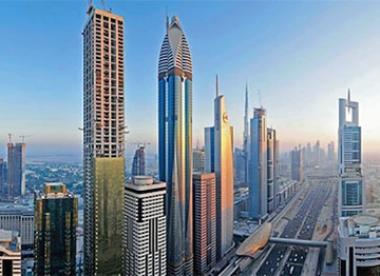Dubai Property Market — A growing magnet for Chinese investors
 Recent statistics shows Chinese individual investors poured about R3,7 billion (approx. 1.3 billion UAE dirhams, US $353 million) in Dubai's real estate last year.
Recent statistics shows Chinese individual investors poured about R3,7 billion (approx. 1.3 billion UAE dirhams, US $353 million) in Dubai's real estate last year.
Chinese individual investors poured about R3,7 billion (approx. 1.3 billion UAE dirhams, US $353 million) in Dubai's real estate last year, nearly tripling that of 2012, as the Middle East's financial hub becomes a growing magnet for the well-off from the world's second-largest economy.
The China Business News reported on Thursday, that statistics from the Dubai Land Department showed about 1,000 individuals from China invested in land, residential housing and office. In 2012, investment stood at 486 million dirhams from only 288 investors.
The spending spree comes mainly as the Chinese wealthy expand their diversified overseas investment in recent years. And properties in Dubai are expected to generate as much as 30 percent of yields, much higher than in Hong Kong, Shanghai, or Beijing, said the report citing industry insiders.
China has increasingly become a main bidder in Dubai's real estate sector, outstripping India, Britain, Pakistan, and Saudi Arabia, which used to be among its top investors before Dubai became debt-ridden and nearly broke during the global financial crisis starting in 2008.
"The 2020 World Expo to be held in Dubai will help shore up the country's economy and drive its housing prices. That's what makes the country increasingly attractive," an unnamed analyst was quoted as saying.
But according to US Wall Street Journal, the recent selloff in Dubai's stock market gathered pace Tuesday, hastened by concerns about one of the Middle East's biggest construction companies.
The benchmark DFM index finished about 6.7% lower on the day and has now lost 25% in a little over six weeks. Tuesday's steep decline centered on Arabtec Holding PJSC, whose shares fell nearly 10%.
Arabtec employs around 60,000 people and has been involved in many of the region's most high-profile building projects, including Dubai's Burj Khalifa, the tallest building in the world. Dubai's largest-listed construction firm accounts for about 5% of the DFM index by market capitalization.
Recently, the company has undergone a major shift toward projects that are often more complex, including major infrastructure projects and oil and gas construction. But its share price has also come under pressure, falling by more than half in the last month, a decline further exacerbated by the abrupt resignation of its chief executive, Hasan Ismaik, last week.
Mr. Ismaik said Tuesday he may unload his 28.85% stake in the company. Another major shareholder, Aabar Investments—an Abu Dhabi government-owned investment vehicle—recently trimmed its holding in Arabtec.
Dubai's recent financial history has been turbulent. The emirate was rocked by a financial crisis in 2009, centered on an over-exuberant property market. Real-estate prices fell by more than half in some places.
In the past year, though, Dubai's economy has picked up steam, on the back of strengthening trade and tourism, and is expected to grow by about 5% this year, according to the International Monetary Fund. The property market has also rebounded strongly since early 2013—property prices jumped more than 50% in some areas in the last 18 months—helped by the perception among some investors that Dubai is a haven compared with other parts of the Middle East that are suffering from political and social unrest.
Dubai's stock market has also recorded strong gains, helped when index compiler MSCI promoted the United Arab Emirates, of which Dubai is part, to emerging-market status in May. Stocks rallied 108% in 2013. Even after the recent declines, stocks are still up 19% this year.
Fahd Iqbal, head of Middle East research for private banking at Credit Suisse, CSGN.VX +0.95% said a correction was overdue. "Valuations were already very overextended and let's not forget that historically markets tend to underperform in the 12 months subsequent to being upgraded by MSCI," he said.
Analysts at London-based Capital Economics said the recent stock market selloff wasn't necessarily an echo of Dubai's previous crisis. "We would be wary of drawing too many parallels with the situation back then," they said. Authorities in Dubai have moved to curb speculation in the local property market, raising transaction fees and introducing mortgage caps, for instance.
Meanwhile, stock markets in the wider Gulf region have already seen some selling amid concerns of contagion from the unfolding crisis in Iraq. Some analysts say the recent Dubai selloff is likely to further dampen regional investor sentiment, especially as trading activity ebbs during the usually slower summer months and the holy month of Ramadan, which begins in a few days.














